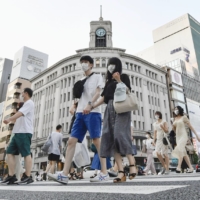Japan’s economy was expanding at a faster pace than initially estimated last quarter ahead of a record surge in virus cases that contributed to Prime Minister Yoshihide Suga’s decision to step down.
Gross domestic product grew at an annualized pace of 1.9% in the three months to June, buoyed by extra government spending, business investment and private consumption, according to a revised report by the Cabinet Office on Wednesday.
Economists had expected growth of 1.6% compared with an initial government estimate of 1.3%.
The revised figures confirm that Japan avoided falling back into recession despite returning to a state of emergency and had greater momentum before the latest wave of infections and activity restrictions. While that points to greater underlying fortitude in the economy, Suga’s failure to stop the sharp jump in infections ultimately proved more significant as public support for his premiership drained away.
“This is mostly a rebound from a contraction in the first quarter and the economy still hasn’t recouped its losses from then,” said Yoshiki Shinke, chief economist at Dai-Ichi Life Research Institute. “So this report doesn’t transform the economic picture into a rosy one. You could say that considering the state of emergency, the economy was resilient and that led to an increase in infection cases.”
Apart from the jump in spending by the government on medical expenses, the result was largely in line with expectations.
The heftier spending by businesses suggests the corporate world is already looking at growth beyond the pandemic, but private consumption largely improved because of a technical factor that doesn’t speak to strong growth. A revision of inflation figures pushed up spending in real terms.
“The outlook turns decisively weaker for the current quarter, as a failure to curb infections has resulted in an extended and expanded state of emergency in major cities,” said Yuki Masujima, economist at Bloomberg Economics.
Looking to the current quarter, the surge in cases during Japan’s Olympic summer is likely to have had a bigger impact on spending by firms and shoppers. It remains unclear who will replace Suga, but economists expect the new premier will unveil a stimulus package to shore up the recovery as the nation heads into a general election this autumn.
“The economy is still fragile and politicians will continue to seek a big spending package before going into a national election, especially given risks are higher in this quarter due to the spread of virus,” Shinke said.
Fumio Kishida, one of the candidates vying to become prime minister, cited a past government report that the gap between supply and demand was about ¥30 trillion ($272 billion) when asked by Bloomberg about the possible size of economic package should he take the helm.
Suga’s replacement will need to do a better job at balancing the goals of keeping COVID-19 under control, protecting the economy and charting a path toward normalizing activity through vaccinations and a lifting of restrictions.
Today’s figures won’t move the needle on the Bank of Japan’s monetary stimulus, given that prices are falling. BOJ board members have recently pointed out the recovery of the economy will be delayed and that easing must continue.
In a time of both misinformation and too much information, quality journalism is more crucial than ever.
By subscribing, you can help us get the story right.
SUBSCRIBE NOW



